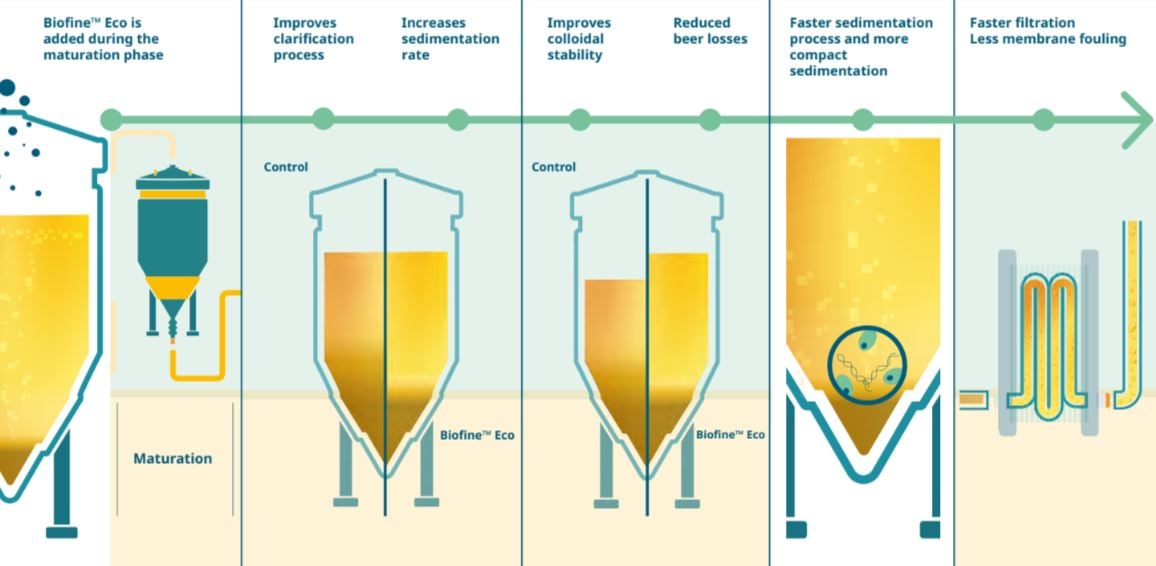
Brewing beer is an energy intensive process that requires a lot of water and generates a decent amount of waste. Luckily, craft breweries are a fairly eco-minded bunch overall. If you’re interested in ramping up the sustainability of your brewing process, taste and nutrition company Kerry launched a new sustainability calculator just for you. The calculator enables brewers to analyze the potential benefits of using sustainable brewing processing aids and enzymes, in terms of both cost savings and environmental gains.
Kerry, of course, offers brewing ingredients and enzymes for brewers with a suite of product options to improve sustainability.
“Although efforts in recent years to improve sustainability have delivered progress, more is needed around the world,” said Juan Aguiriano, Group Head of Sustainability at Kerry Group. “One way to see what is possible is to take the Kerry quick online sustainability calculator test to determine the potential gains. Every brewery is unique, so the calculator’s results are highly customized and can reveal substantial available benefits.”
How it works: The sustainability calculator focuses on three main aspects of the brewing process: raw materials, brewing operations and waste management. With these three components accounting for 35% of a beer’s overall environmental impact, the tool highlights attainable opportunities for brewers interested in reducing their environmental and bottom-line costs without incurring significant capital expenditures.
The calculator process begins by asking for the preferred measurement in barrels or hectoliters, and then the brewery size (in total volume of output per annum). From there, respondents are asked to check boxes regarding five key objectives that will help to analyze each brewery’s unique situation. Each of these deal with brewing solutions that don’t require a capex budget to implement, making them highly accessible solutions. Respondents are asked which of these are of interest to their brewery, for example:
- Increase extract yields, reduce viscosity, and increase levels of raw/unmalted adjuncts.
- Increase trub and cold break compaction, produce clearer worts, and achieve longer beer filtration cycles.
- Increase fermenter capacity, improve hop utilization, and reduce tank cleaning requirements.
- Improve yeast sedimentation and beer clarification to reduce maturation times and improve beer filtration and long-term beer stability.
- Improve yeast viability and vitality in high-adjunct/low-nitrogen brews and optimize fermentation/maturation times.
The sustainability calculator then quantifies the potential positive impacts of using Kerry’s brewing solutions. Applying all five solutions can deliver significant cumulative results. These results, verified by a third-party sustainability technical analysis, can deliver up to 19% energy use reductions, CO₂ emissions reductions of 41%, and €1.70/hl (US$2.35/bbl) cost savings.
“While progress toward sustainability in every brewery has its own unique trajectory, there are impressive possibilities available to help all breweries reduce environmental and brewing costs,” notes Eoin Lalor, Global R&D Director for Alcoholic Beverages at Kerry. “With consumers increasingly seeking out purpose-driven brands that are environmentally focused—almost 90% of global consumers now expect companies to invest in sustainability efforts—the rewards can be high. The COVID-19 pandemic, if anything, has accelerated consumer interest in sustainability, opening up opportunities for brewers to take a progressive position on this important topic.”





Leave a Reply
You must be logged in to post a comment.